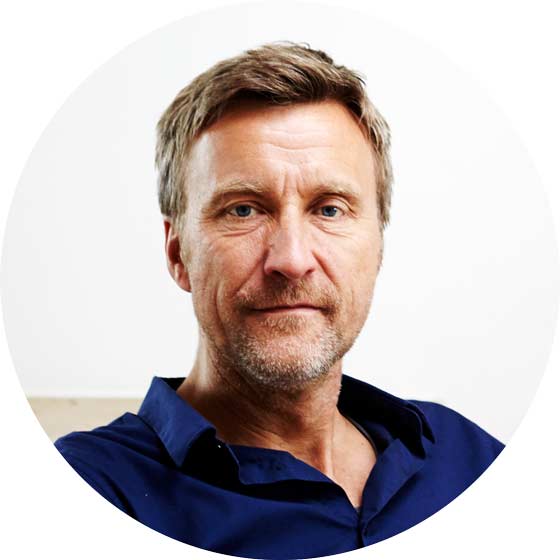Strichpunkt Sustainability Talk #6
Godo Röben

As head of marketing for Rügenwalder Mühle, Röben turned a traditional sausage and cold meat maker into the most-successful brand for meat alternatives. Today, he acts as a consultant for start-ups and established companies looking to do away with animal products and make vegetarian food socially acceptable.
Godo Röben, of all brands, why would a sausage and cold meat brand like Rügenwalder Mühle tackle the issue of meat alternatives?
For precisely that reason. If you want someone to make really good sausages and cold meats, a sixth-generation butcher makes the most sense. People know that Rügenwalder Mühle would never bring out something that doesn’t taste just as good. In other words, they trust the brand.
Why didn’t you launch the new product line under a sub-brand and test out if it worked?
That's exactly what our advertising agents advised us to do as well. “Whatever you do, don’t do it under the Rügenwalder Mühle brand! Vegans will hate us because we are still slaughtering animals – and meat eaters will because we’re caving in to their natural enemies, the vegans.” But I looked at the beer market, among others, where alcohol-free sub-brands like Kelts (König Pilsener) had all failed. Why? Because they weren’t able to benefit from the competence of their parent brand. We didn’t want to repeat that mistake.
Today, the market for plant-based meat generates more than EUR 600 million, and Rügenwalder Mühle is by far the market leader. When it started this evolution in 2011, the market essentially didn’t exist yet.
That’s what marketing people do: sense a shift in society and confront it by offering products and services. After all, any trainee can chase after the market research data. Back then though, we already knew about climate change and the population explosion. I saw how animals were suffering at the big slaughterhouses and noted how demand for vegetarian cuisine was on the rise.
"It was clear to me: something is going on here. And it was high time for us to come to terms with it."
Your colleagues who were used to meat products probably weren't too excited about your idea.
When I first brought the issue up at the company, I was shot down for three years. Out of the 400 Rügenwalder employees at the time, 399 were against my idea. But luckily, that one person was the owner.
How did you get all the rest of the staff on board?
It took me a while to understand that I needed to communicate more with my colleagues and explain my rationale. So I drafted a speech and explained at a works meeting that people simply don't want factory farming any more, that climate change is exacerbated by meat production and that we need to go with the times. My final sentence was: “Sausages will be the cigarettes of the future.” You could have heard a pin drop in that room.
The responsibility of setting such a 180-degree turn in motion must be immense. How badly did you sleep during that time?
I slept incredibly well because I was completely convinced I was doing the right thing. After all, it's clear we cannot feed what will soon be the 10 billion people on this planet with meat. It wasn't some kind of propagandist insight, but a simple calculation.
The logical alternative would be to eat vegan or at least vegetarian food.
Correct. But consumers are not going to willingly give up a third of their diet. If I go three days without a bite of meat, I’m missing something too. Which is why the food industry needs to follow the lead of the automotive industry: remove the bad products – diesel- and petrol-powered vehicles – from their product portfolio, and add modern products like vehicles powered by battery or hydrogen. After all, you can't stop people from driving cars by continually pointing to buses, trains and bicycles.
Today, many companies are at a similar tipping point as Rügenwalder Mühle was back then. Their old product portfolio has run its course, but there isn't a market for the new one yet. Many are deeply afraid as a result.
The only people who need to be afraid are those who won't dare to take a chance on something new. To understand this, you just need to take a look at the graveyard of what were once big companies like Nordmende, Nokia, Grundig, HB and Schlecker – companies that didn't recognize that times were changing and missed out on their opportunities. How does the saying go? The future belongs to the brave.
Godo Röben
Sign up here!
Learn more about the topic in our podcast. Listen now!
Let's talk
Lust, über die nachhaltigen Potenziale Ihrer Marke zu sprechen?
Harald freut sich auf einen lockeren Austausch. Einfach eine kurze Nachricht an h.willenbrock@sp.design schreiben.

Harald Willenbrock
Head of Concept & Content